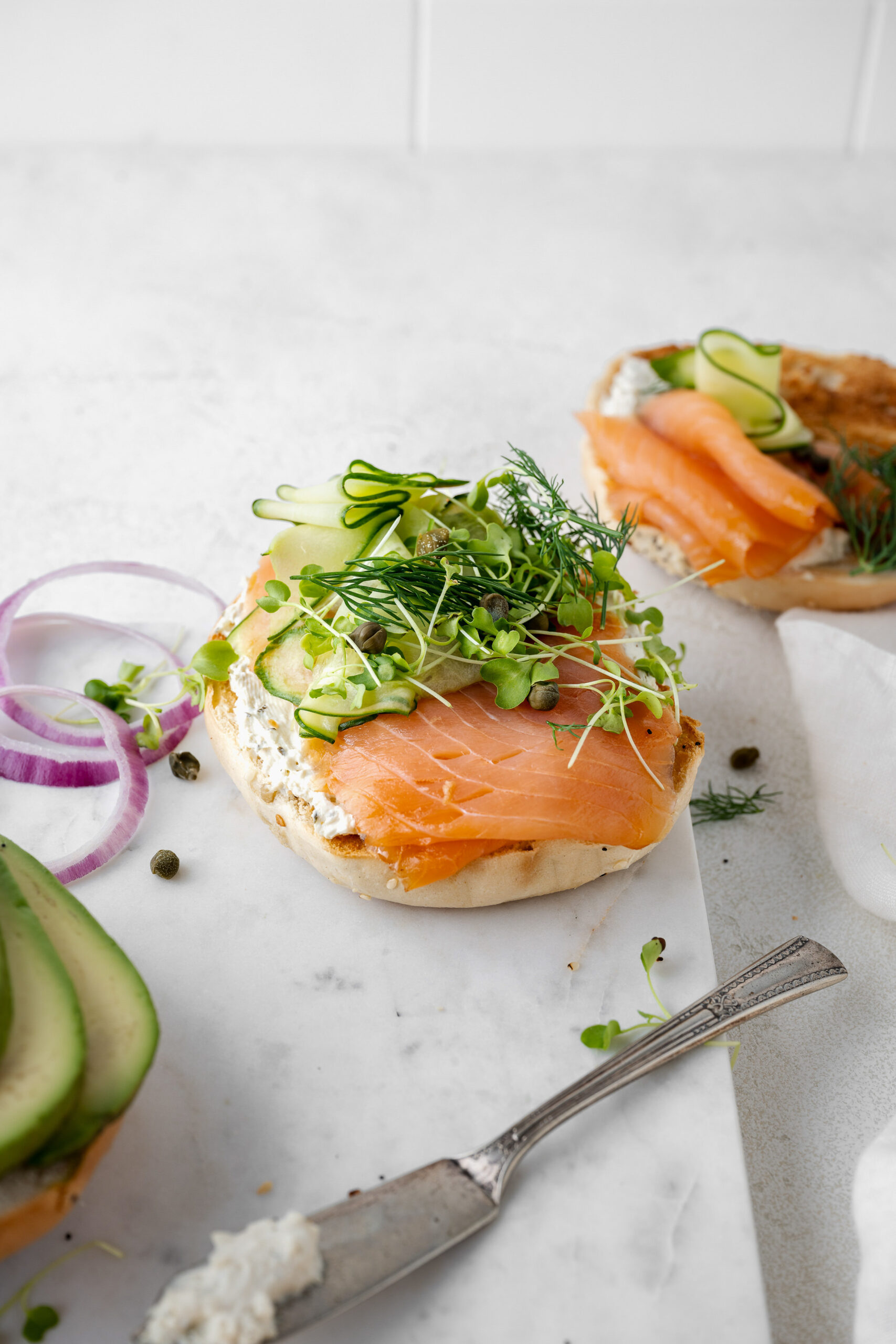
Posted: Monday, August 18, 2025 | By Inge Bundchen, Psychiatric Nurse Practitioner
Foods for better sleep is one of the most overlooked aspects of addressing insomnia, yet what you eat and when you eat it can significantly impact your ability to fall asleep and stay asleep. As a psychiatric nurse practitioner who combines traditional medicine with holistic approaches, I’ve seen how the right nutritional choices can transform sleep quality for women in their 60s and beyond.
The relationship between nutrition and sleep becomes even more important as we age. Hormonal changes, slower metabolism, and medication interactions all influence how our bodies process food and regulate sleep cycles. The good news? Small, gentle adjustments to your eating patterns can make a profound difference in your rest.
This isn’t about restrictive dieting or complicated meal plans. It’s about nourishing your body in ways that support natural sleep rhythms while honoring your preferences and lifestyle. These evidence-based nutrition strategies specifically address sleep challenges that affect women over 60.
Understanding Sleep Nutrition After 60
Your body’s relationship with food changes as you age, and this directly affects sleep quality. Several factors make nutrition particularly important for sleep in mature women:
Menopause-related hormone changes affect how your body processes certain nutrients and regulates appetite hormones that influence sleep-wake cycles.
Slower digestion means that foods take longer to process, potentially affecting comfort and sleep if eaten too close to bedtime.
Medication interactions with certain foods can either enhance or interfere with sleep medications or supplements you might be taking.
Changed appetite patterns may mean you’re eating differently throughout the day, which can impact nighttime hunger and sleep quality.
Blood sugar sensitivity often increases with age, making stable glucose levels more important for uninterrupted sleep.
Understanding these changes helps you work with your body rather than against it when choosing foods for better sleep women over 60.
Science-Backed Sleep-Supporting Nutrients for Mature Women
Certain nutrients have been scientifically shown to promote better sleep quality and duration. Here’s what the research tells us about key sleep-supporting compounds that work especially well for women over 60:
Tryptophan is an amino acid that helps your body produce serotonin and melatonin—both crucial for healthy sleep cycles. Your body can’t make tryptophan on its own, so you need to get it from food.
Magnesium acts as a natural muscle relaxant and helps regulate neurotransmitters that calm the nervous system. Many women over 60 are deficient in this crucial mineral, making supplementation through food sources particularly important. Check out a few recipes high in magnesium here.
Complex carbohydrates help tryptophan cross the blood-brain barrier more effectively, supporting the production of sleep-promoting brain chemicals.
Calcium works with tryptophan to manufacture melatonin. It also helps regulate muscle movements and may reduce restless leg syndrome that can disrupt sleep in older women.
Potassium helps relax muscles and may reduce nighttime leg cramps that can wake you up.
B vitamins, particularly B6, are essential for converting tryptophan into serotonin and help regulate your body’s internal clock.
The beautiful thing about focusing on these nutrients is that they occur naturally in whole, nourishing foods that support overall health, not just sleep. This makes them ideal components of a sleep nutrition plan for women over 60.
Best Foods for Better Sleep Women Over 60
Cherries and tart cherry juice are among the few natural sources of melatonin. Research shows that drinking tart cherry juice can improve sleep duration and quality. Try a small glass about an hour before bed.
Almonds and walnuts provide magnesium, healthy fats, and protein that help stabilize blood sugar throughout the night. A small handful makes an excellent evening snack.
Turkey and chicken are rich in tryptophan, but you don’t need large portions. A few ounces paired with complex carbohydrates can be sleep-supporting.
Oats and whole grains provide complex carbohydrates that help tryptophan reach the brain while keeping blood sugar stable. A small bowl of oatmeal with a drizzle of honey can be a perfect bedtime snack.
Bananas contain both potassium and magnesium, plus natural sugars that help tryptophan enter the brain. They’re also easy to digest.
Leafy greens like spinach and kale are rich in calcium and magnesium. Consider adding them to your dinner salad or smoothie.
Fatty fish such as salmon and sardines provide omega-3 fatty acids that support serotonin production and may improve sleep quality.
Herbal teas, particularly chamomile, passionflower, and lemon balm, contain compounds that naturally promote relaxation and sleepiness.
The key is incorporating these sleep-promoting foods for mature women regularly into your diet, not expecting immediate results from a single meal.
Foods That May Disrupt Sleep in Women Over 60
Just as some foods promote sleep, others can interfere with your ability to rest well. Being aware of these potential sleep disruptors helps you make informed choices about your nutrition:
Caffeine sensitivity often increases with age, so that afternoon coffee or tea might still be affecting you at bedtime. Consider switching to herbal tea after 2 PM.
Alcohol might make you feel drowsy initially, but it disrupts sleep cycles and can cause middle-of-the-night awakenings. It also interferes with REM sleep.
High-fat or fried foods take significant energy to digest and can cause discomfort when eaten close to bedtime.
Spicy foods can cause heartburn or raise your body temperature, both of which can interfere with sleep.
Large amounts of liquid close to bedtime can lead to nighttime bathroom trips that disrupt sleep continuity.
High-sugar foods can cause blood sugar spikes and crashes that may wake you up in the middle of the night.
Excessive protein close to bedtime requires a lot of energy to digest and may keep your body working when it should be winding down.
This doesn’t mean you need to eliminate these foods entirely—just be mindful of timing and quantities when planning foods for better sleep women over 60.
Meal Timing Strategies for Sleep Nutrition After 60
When you eat can be just as important as what you eat when it comes to supporting quality sleep in women over 60. Here are some gentle guidelines that work well for most mature women:
Eat your largest meal earlier in the day when your digestive system is most active. This doesn’t mean you can’t enjoy dinner, just consider making lunch your main meal.
Finish eating 2-3 hours before bedtime to allow adequate digestion time. This prevents discomfort and reduces the likelihood of sleep disruption.
If you need an evening snack, choose something light and sleep-supporting like a small banana with almond butter or a cup of chamomile tea with a few whole grain crackers.
Stay consistent with meal timing when possible. Your body thrives on routine, and regular eating patterns support your natural circadian rhythms.
Listen to your body’s hunger cues rather than forcing yourself to eat or restricting food if you’re genuinely hungry.
Remember, these are guidelines, not rigid rules. The goal is finding what works best for your body and lifestyle.
Hydration and Sleep: Finding the Right Balance
Proper hydration supports overall health and can improve sleep quality, but timing matters. Here’s how to stay well-hydrated without disrupting your sleep:
Focus on hydration earlier in the day. Aim to drink most of your daily water intake before 6 PM.
Reduce fluid intake 2-3 hours before bedtime to minimize nighttime bathroom trips.
If you’re thirsty before bed, take small sips rather than drinking large amounts.
Consider herbal tea as part of your bedtime routine. The warm liquid can be soothing, and many herbs have sleep-promoting properties.
Be mindful of medications that might affect your hydration needs or increase nighttime urination.
Pay attention to your individual patterns. Some women find they can drink more later in the evening without disruption, while others need to stop earlier.
The goal is maintaining good hydration while protecting your sleep quality.
Special Sleep Nutrition Considerations for Women Over 60
Several factors unique to mature women can affect how nutrition impacts sleep:
Menopause-related changes in hormone levels can affect appetite, metabolism, and sleep patterns. You might find your food preferences and tolerance change during this time.
Medication interactions become more common with age. Some medications can affect nutrient absorption or interact with certain foods. Always discuss dietary changes with your healthcare provider.
Digestive changes may mean foods that never bothered you before now cause discomfort or affect your sleep. Pay attention to how different foods make you feel.
Bone health considerations might mean you’re taking calcium supplements. Taking these with magnesium in the evening can support both bone health and sleep.
Changes in appetite are normal and may mean adjusting portion sizes or meal frequency to maintain stable energy and blood sugar levels.
Social eating patterns might have changed, especially if you’re newly single or dealing with family transitions. Focus on nourishing yourself well regardless of your dining situation.
These changes aren’t obstacles—they’re simply new information to help you optimize your nutrition for better sleep after 60.
Creating Your Personal Sleep Nutrition Plan for Women Over 60
Developing a sustainable approach to sleep nutrition is more art than science. Here’s how to create a plan that works for your life:
Start with small changes rather than overhauling your entire diet. Maybe begin by adding a handful of almonds to your afternoon routine or switching your evening wine to herbal tea a few nights a week.
Keep a simple food and sleep journal for a week or two. Note what you eat, when you eat it, and how you sleep. You might discover patterns you hadn’t noticed.
Focus on addition rather than restriction. Instead of thinking about what you can’t have, concentrate on adding sleep-supporting foods to your existing meals.
Consider your individual preferences and tolerances. If you hate bananas, there are plenty of other potassium-rich foods. If dairy bothers you, focus on non-dairy sources of calcium.
Plan for your lifestyle. If you eat dinner out frequently, research restaurants that offer sleep-friendly options. If you prefer simple meals, focus on easy-to-prepare options.
Be patient with the process. Nutritional changes often take several weeks to show noticeable effects on sleep quality.
Work with your healthcare providers, especially if you’re taking medications or managing health conditions that might be affected by dietary changes.
Simple Sleep-Supporting Meal Ideas
Here are some gentle, practical meal and snack ideas that incorporate sleep-promoting nutrients:
Morning: Oatmeal topped with sliced banana and chopped walnuts, or a smoothie with spinach, banana, and almond milk.
Lunch: Salmon salad with leafy greens and avocado, or turkey and avocado wrap with whole grain tortilla.
Dinner: Grilled chicken with sweet potato and steamed broccoli, or a bowl of vegetable soup with whole grain roll.
Evening snack options: Small banana with almond butter, a cup of chamomile tea with a few whole grain crackers, or a small portion of Greek yogurt with a drizzle of honey.
Bedtime beverages: Warm almond milk with a pinch of cinnamon, caffeine-free herbal tea, or tart cherry juice diluted with water.
These are starting points—adjust portions and ingredients based on your preferences and needs.
When to Seek Professional Guidance
While nutrition can significantly improve sleep quality, sometimes additional support is helpful:
If you have multiple health conditions that affect your dietary needs, work with a registered dietitian who understands both nutrition and sleep.
If you’re taking multiple medications, discuss potential food interactions with your pharmacist or healthcare provider.
If sleep problems persist despite nutritional improvements, consider working with a healthcare provider who specializes in sleep disorders or integrative approaches to insomnia.
If you have a history of eating disorders, approach dietary changes gently and consider working with a professional who understands both nutrition and mental health.
If you’re experiencing significant digestive issues, these should be addressed as they can interfere with both nutrition absorption and sleep quality.
Remember, nutrition is just one piece of the sleep puzzle, though it’s often an important one.
Your Nourishing Path to Better Sleep
Food is medicine, and choosing sleep-supporting nutrients is a form of self-care that honors both your body’s needs and your desire for restorative rest. The goal isn’t perfection—it’s progress toward choices that support your overall well-being.
You deserve to wake up feeling refreshed and nourished. You deserve to enjoy food that supports your health rather than complicates it. Most importantly, you deserve to approach nutrition with self-compassion rather than self-criticism.
Small, consistent changes in how and what you eat can create meaningful improvements in your sleep quality. Start where you are, use what works for your body and lifestyle, and be patient with the process.
Your relationship with food and sleep can continue to evolve and improve throughout your 60s, 70s, 80s, and beyond. Nourishing yourself well isn’t just about the food on your plate—it’s about honoring your body’s wisdom and supporting your overall vitality.
Sweet dreams start with mindful nourishment, one gentle choice at a time.
Ready to explore more sleep-supporting strategies? Check out my articles on Sleep Disorders in Women Over 60: Expert Guide to Better Rest and Mental Health and The Healing Power of Sleep.
About the Author: Inge Bundchen is a Psychiatric Nurse Practitioner with over 15 years of experience helping women navigate mental health and wellness challenges in their 60s and beyond. She takes an integrative approach to mental health care that includes nutritional support for sleep and mood disorders.
Related Resources:
- A Gut-Healthy Morning Routine: Start Your Day Right
- 5 Signs Your Body is Asking for a Mental Health Check-In After 60
- Prescription Medications and Nutrient Depletion
What sleep-supporting foods have you found helpful? Share your experience in the comments below—your insights might help another woman on her journey to better rest.
Foods for Better Sleep for Our Wisdom Years (Over 60)
Posted In
August 20, 2025
meet inge
I’m Inge, a Psychiatric Nurse Practitioner passionate about helping others feel grounded, resilient, and well. Here on the blog, I share insights on mental health, prevention, meditation, clean skincare, and nutrition—everything I turn to in my own daily life. I hope this space becomes a trusted part of your wellness journey.
LATEST FROM THE BLOG

“I’m too old to learn something new.” “My best years are behind me.” “What’s the point of starting now?” If these thoughts sound familiar, you’re not alone. As a psychiatric nurse practitioner who has worked with women over 60 for more than 15 years, I hear these age-related limiting beliefs almost daily. But here’s what […]

Sleep problems in older women are reaching epidemic proportions, yet most of us have been told they’re simply “part of aging.” As a psychiatric nurse practitioner who has spent over 15 years working specifically with women navigating their 60s and beyond, I can tell you this harmful myth is keeping millions of women from the […]

Let’s talk about why midlife—especially your 50s and beyond—is the perfect time to reinvent your healthy aging plan, and how to do it in a way that feels gentle, joyful, and deeply sustainable.

You know that delicious moment when your head sinks into the pillow, your body sighs, and your whole system whispers, “Finally.” That’s not just comfort—it’s medicine. Sleep is more than a pause in your day—it’s the deepest reset your brain and body know. As a psychiatric nurse practitioner, I’ve seen firsthand how disrupted sleep can […]

A morning routine the tone for our entire day, and establishing a gut-healthy routine can make a significant difference in how we feel.